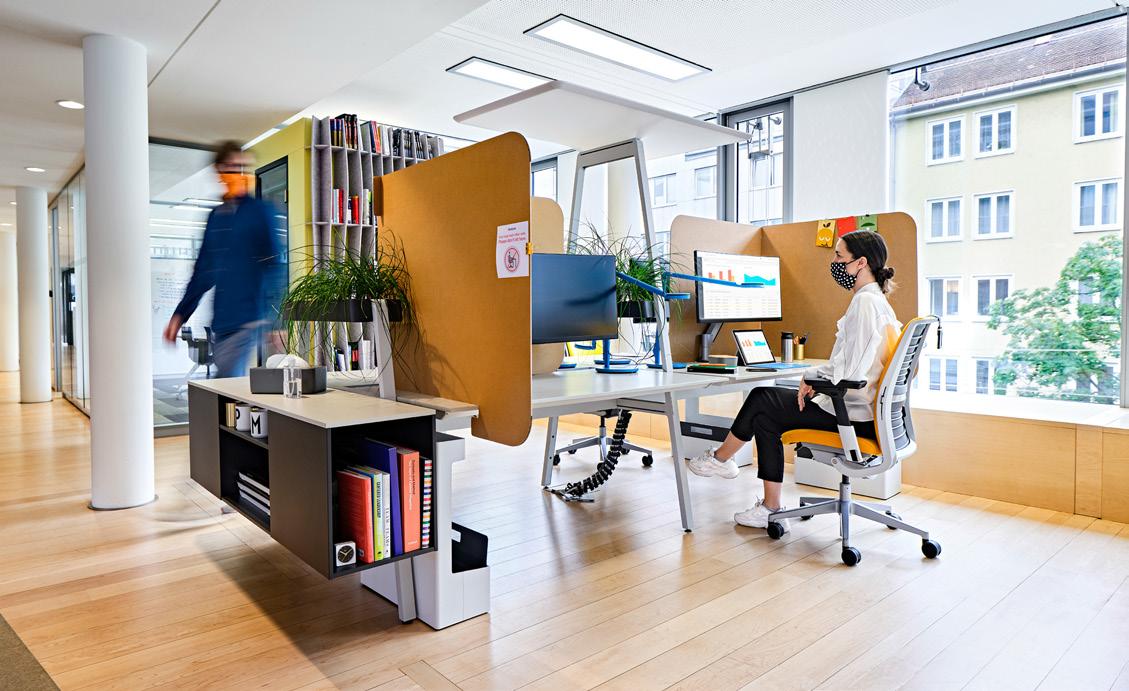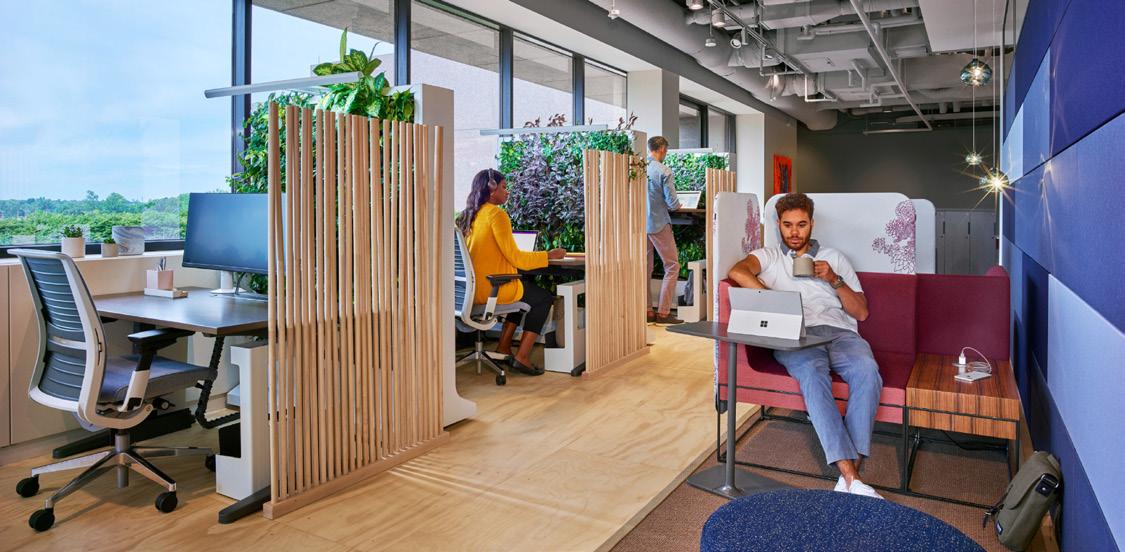
18 minute read
Okto Technologies - A Breath Of Fresh Air For Workplaces
EyeonFuture Of The Office
OKTO Technologies – A Breath Of Fresh Air For Workplaces
One of Northern Ireland’s most innovative companies has developed a range of air purifying and air quality management solutions for any office, school, workplace, business or home setting which is able to effectively eliminate the risk of ultra-fine airborne particles, much smaller than Covid.

OKTO Technologies, based in Lisburn but with a major design and sales operation in Central London and a new upcoming office in Dublin, is the driving force behind the new OKTOair range of air quality management solutions.
The Lisburn company has its roots back in 1992 when Managing Director Philip Dowds set up a firm specialising in analogue television aerials.
“Our first sale was worth £28.50. I remember it well,” he says. “Since then, we worked out recently, our sales have grown by 155,000%.”
The company moved from TV aerials into the wider audio-visual technology marketplace before moving on to specialise in smart building solutions right across the board. Philip Dowds recalls that when the company first came to seek work in London, its ‘office’ was a branch of Starbucks on Brompton Road.
“We talked to our clients in construction about what their problem areas were, and what solutions they wanted,” says Philip. “They talked about contractors taking less time on site and about making technology simpler.
“We came up with a method that saw us build solutions in Lisburn and testing them there before sending them over to London or elsewhere. So it takes one third of the time that other suppliers might take and it also requires less people on site, which is hugely important at the moment.”
Modern methods of construction, he says, mean that the industry is moving towards the kind of lean principles already adopted by many in manufacturing.
Since then, OKTO has provided full automation solutions in multi-million pound apartments from London’s Knightsbridge and Belgravia to the South of France; at Claridge’s in London and Nobu restaurant in Monaco and – closer to home – at the headquarters of local law firms Pinsent Masons and Arthur Cox.
“We are the only company able to provide a full End-to-End solution for buildings right across functions like heating, lighting control, AV, IT, security, BMS, Wellness and air quality. It is unique to OKTO and we take end to end responsibility”
The business is split down the middle geographically, with approximately half of OKTO’s staff in London and the other half in Lisburn. It has a team of project managers, designers and engineers based in London, where the majority of the firm’s work is based. Lisburn hosts a second team of designers and engineers but is also home to OKTO’s administration base and off-site production facilities.
Emerging technologies and innovation are central to everything OKTO does. The company, for instance, is pioneering the use of software to test software. It’s also developing ways of commissioning off-site using what’s known as a ‘digital twin’.
“At the minute, we still need to have someone standing in the room to see how systems react to a window being opened or heating turned up. The digital twin system will allow us to do that remotely.”
Covid has impacted on OKTO and its work but Philip Dowds reckons that they’ve been fortunate. “There was a lot of uncertainty at the very start of the pandemic but most of our sites have kept working throughout. The market has become a bit more aggressive though, with quite a few companies desperate for cashflow.
“OK, we do work at the top end of the market. But our customers can afford the best cost consultants and they’re very good at driving a hard bargain.”
The company’s move into air quality management wasn’t entirely driven by Covid. “We’ve always been interested in environmental control,” says Philip. “But there’s no doubt that Covid accelerated our
EyeonFuture Of The Office
plans. Everyone wants to talk about it these days. But it’s important to note that our wellness and air quality management solutions can deliver long term health benefits well beyond the pandemic.”
OKTOair wellness can offer a full range of solutions from domestic and small business up to large-scale office spaces, from 500 square feet up to one million square feet, and from portable units right up to fully-engineered, integrated systems with artificial intelligence built in.
The product range is still in its relative infancy in this country. In the US, similar systems have been installed in some 70,000 schools and by major financial institutions such as Morgan Stanley and JP Morgan as well as a number of major airports.
OKTO is well aware that the potential opportunity is huge. “We talked to a global insurance company just recently about their Return To Office programme. We know that employers have to build confidence and trust amongst their employees.”
The company’s solutions will play their part in a new breed of offices, different in many ways to the ones we populated pre-Covid. It’s even working on broader office management systems which can, for example, monitor hot desk usage and ensure that each desk is cleaned before and after each use.
“There is no one else in the world doing precisely what we are doing,” says Philip Dowds.
“In bigger buildings, our systems can constantly read both the indoor and outdoor air quality. So it can bring in good quality air from outside but, if that’s not up to standards, it will filtrate and disinfect the indoor air, all the time re-measuring, re-monitoring and keeping the staff informed.
Nothing else on the planet is doing that at the moment.”
Whether it’s a new building or an existing building of any age, OKTO’s specialists say that they can find a solution. “Our systems can go into a cabinet, into the ceiling, behind walls. We take a bespoke approach to every commission.”
The company’s eye to detail is reflected in the fact that it’s also working hard on the acoustics of its systems, ensuring that only minimal amounts of noise are generated while air quality management is in operation.
An OKTO solution won’t be costly on the energy front, either. The systems are designed to be energy efficient, over 50% more energy efficient, in fact, than standard air filtration systems.
At the smaller scale end of the market, the OKTOair systems are effectively plug and play, cost starts from £499 per unit covering up to 500 sq.ft and use less energy than a single light bulb... a fact which will go a long way to reassuring potential buyers.
The company has also calculated that the investment of one its units in a typical school classroom would cost 17p per day per child.
Looking to the future, Philip Dowds is excited about what fast-moving technology can achieve. “We’re looking at ways in which AI can be built into our smaller solutions and there is a lot of potential there,” he says. “And we see a future where air filtration systems and controls can be built into existing furniture. We know that not everyone wants a stand-alone unit sitting in the corner of their room.”
How does he view the short-term future? “Put it this way, I doubt if we’re going to meet all the deadlines we have for new proposals... and that’s a brilliant sign. There is definitely pent-up demand out there, so we’re very optimistic.
OKTO is accredited to the International Well Building Institute, a global body which sets out to apply standards and ratings to building based on their ‘wellness’ for employees. A number of its employees have studied for the Institute’s professional qualifications and they look to have the most WELL AP staff accredited in the country.
The company’s specialists have become evangelists about air quality. Indoor air quality in most offices is poor, they say. Quality air, on the other hand, can increase activity levels, improve cognitive functions and productivity, reduce sick days and help to counter anxiety and workplace stress. For every 1000 workers, a US study estimated, poor air quality can account for 600 sick days. It’s become such a problem that the World Health Organisation has described poor indoor air quality as the ‘new tobacco’.
And those statistics date back to the pre-Covid era. Add that in and air quality management is likely to be a no-brainer for many organisations.


Email: info@oktoair.com Tel: 028 9266 7030 www.oktoair.com
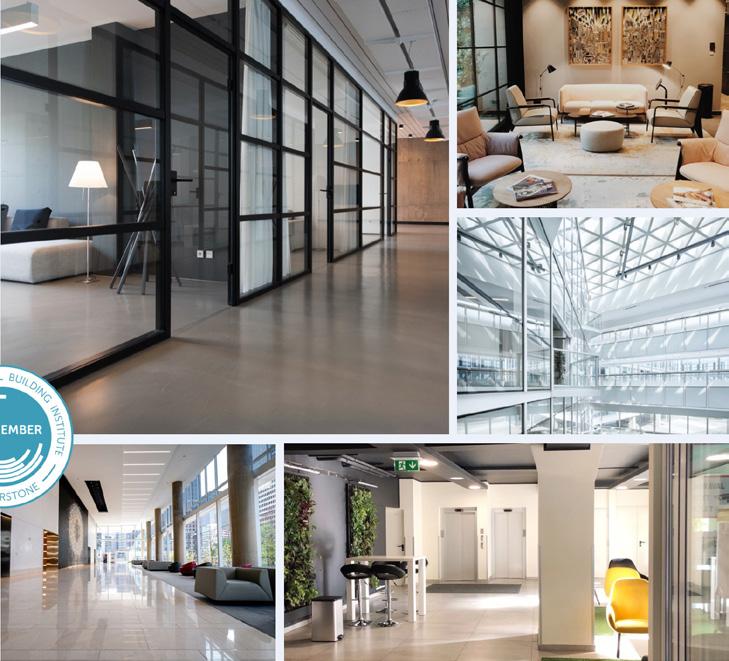
EyeonFuture Of The Office
Nationwide Makes The Move To Home Working Post-Covid...But Who Will Follow?
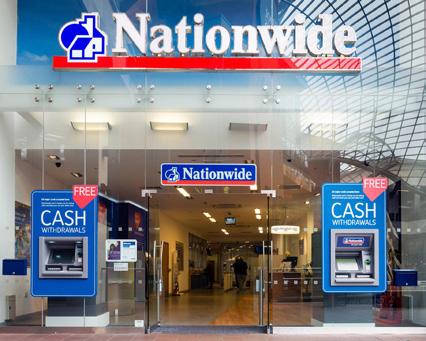
Here in Northern Ireland, Newtownards-based insurace group Hughes Insurance became the first organisation to offers its staff home working on a permanent basis post-Covid.
Now Nationwide has become the biggest national organisation to make the move to home working on a permanent basis. The bank/building society is to tell 13,000 of its staff, although not those based in branches, to work where they want when the coronavirus pandemic restrictions are lifted.
The UK’s biggest building society, which has called the initiative Work Anywhere, is to introduce the plan after more than half of employees (57%) said they wanted to work from home full time. More than third (36%) said they wanted a blend of home and office work, while just 6% opted for a return to a five-day week in the office.
“The last year has taught many of us that ‘how’ we do our jobs is much more important than ‘where’ we do them from,” said Joe Garner, the building society’s chief executive. “We have listened and learned, and we are now deciding to move forward, not back. We are putting our employees in control of where they work from.”
The company said that as a result of a reduced need for space, it would shut three GB offices where about 3,000 staff are based. Affected employees have the option of taking up the new flexible home-working policy or transferring to Nationwide’s nearby headquarters.
The building society said that while the 6,000 staff based at its branches were not able to take up the flexible option, the company was “working with employees to understand what would help them better manage their working day around their home lives”.
As part of a “work, meet, recruit, live anywhere” initiative, Nationwide is also trialling a scheme where traditionally office-based employees can work in branches with colleagues.
Nationwide said the staff survey, which was conducted with Ipsos MORI , also found that 43% of remote workers said they still needed some face-toface time with colleagues to do their jobs effectively. The company said its offices would now become “hubs” and it was investing in more collaboration spaces and a range of wellbeing measures such as quiet areas. The finding appear in its Future of Work report.
But will others now follow suit?
It’s by no means certain. A number of other organisations have signalled that, while a hybrid model will be adopted, offices will remain important to how they run their businesses.
Global Bank Opts For Hub & Spoke Option
The offices versus working from home conundrum is being tackled all over the world. Take the case of global bank Standard Chartered. It says it will be offering employees the option of heading to a “near home” location, which it will rent from an office-sharing company. Workers will also have the permanent choice of working from home more.
Chief Executive Officer Bill Winters plans to roll out a “hub-and-spoke” model for his offices that few big companies have ever even tested. It’s a good thing StanChart hasn’t committed to any firm targets on how many people will work in the new fashion, or for how many days of the week. Once reality kicks in, it may have to dial back its aspirations.
Those who find WFH too stifling might see the appeal of a satellite office in their nearest town, and it might be appropriate in countries where StanChart has big support functions such as Poland, Malaysia, China and India. Rather than commute into a big city, workers get the option of recreating the community aspects of office life closer to home.
It would also help address technology deficiencies in some places. For example, some banks halted operations in India at the onset of the pandemic because employees lacked basic tools for remote working, including laptops.
But the organizational challenges of managing all of these new locations cannot be underestimated. Will it work as well for frontline bankers as for back-office staff? And there’s no mention yet of the impact on cost.
Renting desks from a WeWork-type company would be cheaper — and more flexible — than the decades-long leases that downtown commercial property commands, especially in prime cities such as London and New York. Co-working spaces offer pay-per-use models that help keep costs in check. This might explain StanChart’s eagerness: The bank’s profitability targets are slipping amid the pandemic recession.
The company’s chief financial officer, Andy Halford, believes “the word ‘office’ will become a bit of a thing of the past.” Fair enough, but the “hub and spoke” idea does create worrying new levels of complexity. Why not just stick with the model being developed at other banks, which balances WFH with coming to the main offices? Italy’s UniCredit SpA has recently offered staff the choice of permanently homeworking for two days a week, after one day proved popular — and manageable. A step-bystep approach seems more sensible.
Some firms that operate across many offices to accommodate staff from further afield are finding they no longer need all that real estate because WFH has proved so successful during the pandemic.
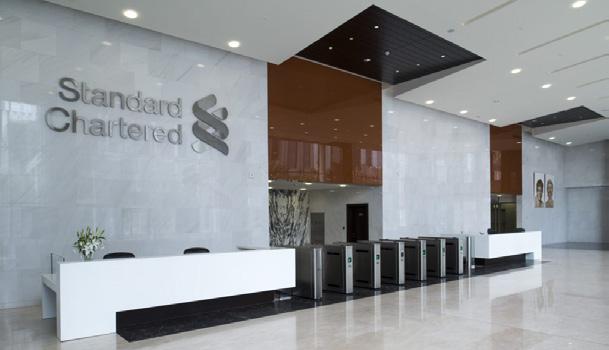
EyeonFuture Of The Office
Chancellor Backs A Return To Office Working
Chancellor Rishi Sunak has told a British newspaper that workers must be allowed to return to the office or they may “vote with their feet” and move elsewhere.
Speaking to The Telegraph, Sunak commented: “You can’t beat the spontaneity, the team building, the culture that you create in a firm or an organisation from people actually spending physical time together.”
He also suggested that employees may “vote with their feet” and quit in favour of bricks-and-mortar based rivals if these opportunities aren’t provided.
When Will Offices
Reopen in 2021?
It’s been just over a whole year of working from home for many of us, however 54 per cent of us are apparently happy to continue working from home for as long as necessary.
However, the mental strain of a radically changed working life can’t be underestimated. Our working social lives are all but reliant on online gettogethers, creative and collaborative work faces additional barriers and our work-life balance is suffering.
This uncertainty is leading many to predict when exactly will we return to our offices, if at all.
More Than a Third of Companies Will Move to Smaller Offices in 2021

Following reports that Nationwide is to allow 13,000 office staff to choose where they work under a new flexible working scheme, serviced office agent FreeOfficeFinder has reported that 35 per cent of firms are planning on taking smaller offices.
The average desk rates in London and the UK decreased by more than 7 per cent from January 2020 to January 2021. Almost two-thirds cite employee demand for flexible working as a factor, with an average reduction of space at 20 per cent per company.
This echoes other recent research that shows that UK office workers value their new norm of working from home so much that many would forsake career progression, company benefits and even a pay rise to maintain it.
Ezra, a provider of digital coaching, has also found from their research of 1,976 UK office workers that just a quarter of workers plan to return to the office full time.
Covid & Our Sleep...A Workplace Problem
It’s now well over a year since the UK, including Northern Ireland, crashed into its first lockdown as a response to coronavirus.
In that time, research indicates that the stress and uncertainty of multiple lockdowns and the threat of the virus has caused more people sleepless nights, including increased levels of insomnia and other sleep-related problems.
Findings indicate that in the UK, roughly 75 per cent of people have experienced a change to their sleep patterns since March 2020.
Research by IT company Insight based on a recent Kantar survey (of 1,250 working adults) calculated that nearly 9 million sick days are taken because employees can’t cope with the pressure of work – and disrupted sleep is one of

In yet another net effect of the Covid crisis, 75 per cent of people say that they have experienced a change to their sleep patterns since March 2020.
the most common effects of stress.
As people prepare for their “new normal”, the latest research from Advanced Workplace Associates (AWA) - a science-based workplace consultancy that provides expert training and research in cognitive fitness, human performance and new ways of working - in partnership with the Center for Evidence-Based Management, has identified sleep as one of the major factors behind cognitive performance.
Cognitive performance research studies conclude that sleep deprivation has a negative impact upon almost all brain functions, including decisionmaking, problem-solving, memory, controlling emotions / behaviour and coping with change. Reaction times may be slower, more mistakes may be made, and tasks often take longer. All of these will impact mental performance and employee relationships at work.
This was a topic addressed at ThisWeekinFM’s Workplace Excellence channel at RE:Connect, with Dr. Jo offering practical strategies to sustain concentration, focus, and stamina in order to improve productivity and prevent burnout.
EyeonFuture Of The Office
Flexibility is Key for the Future of Office Working
Over the past 12 months, every aspect of life, including working life, has changed exponentially. As restrictions slowly begin to ease and as we creep closer to the end of lockdown, many questions are being asked regarding the future of office working and what that might look like for businesses.
According to Donna Linehan, Client Services Director at VenYou, the flexibility provided by the serviced office sector could be the way forward.
Donna writes…With hybrid working arrangements set to likely become the norm in a post-COVID world, the serviced office sector could offer some businesses a lifeline in terms of the flexibility that will be required.
Over the next few months, and indeed years, we could see a greater dependence on the serviced office sector as more and more companies begin to move away from the conventional office set-up and the trappings that can sometimes be associated with them.
We understand that every business is different and therefore facing different challenges in this current climate, however flexibility is of utmost importance if hybrid working is to be a success. Flexibility is something that VenYou prides itself on and something we have been providing for our tenants at the Scottish Provident Building since our inception.
Contrary to many traditional office set-ups, VenYou offers flexible, shortterm lease contracts and predictable monthly payments which includes rent, broadband, electricity, cleaning and phone bills. Our flexible leases mean that our tenants only pay for what they need, making the blend between office and home working easier, as well as being more cost effective for business owners.
In terms of space, we’re acutely aware that this will be a top priority for many businesses going forward. Built in the early 20th century, the Scottish Provident Building boasts a traditional layout, which means there’s plenty of space for companies to grow and expand. Most of our offices can comfortably house between three and eight members of staff, whereas some of our larger offices can accommodate for up to 20 desks. In addition, the layout of the offices also ensures that the current social distancing guidelines can be adhered to amongst employees.
Furthermore, technology has always been a tool heavily relied upon by businesses but no more so than over the last 12 months as practically all meetings were hosted virtually. The Scottish Provident Building has a number of conference and meeting rooms that are fully equipped with the latest stateof-the-art technology. In fact, we recently purchased and installed Display Note Launchers in two of our conference rooms, which will allow our tenants to connect to calls and apps quickly and more securely.
As well as more businesses considering hybrid working in the future, some have already made the decision to have their staff work from home on a permanent basis, even when the lockdown is fully lifted. Whilst decisions like these have been made by business owners in a bid to save money, VenYou also provides an affordable virtual package which may prove advantageous to these companies.
Virtual tenants at the Scottish Provident Building can avail of a city centre address, reception services as well as being able to book conference rooms if a venue is required to host a meeting or a client.
Having worked closely with countless businesses over the years, I can fully appreciate how difficult it is for companies to plan for the future when it remains quite uncertain. However, one thing I can say with certainty is that VenYou has the ability to cater for every business regardless of how complex their needs may be.


Contact the VenYou team today for more information by calling; 028 9091 8500 or visit the website: www.venyou.co.uk.
LET US REDESIGN YOUR WORKSPACE FOR YOUR COLLEAGUES’ SAFE RETURN TO WORK
